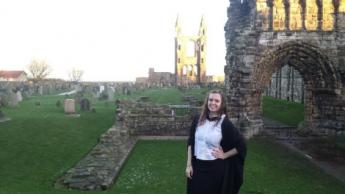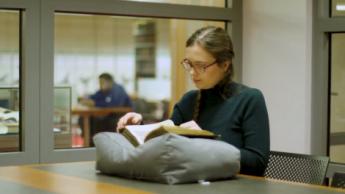Actualités
'My year in St. Andrews was one of the best in my life'â

I spent the academic year of 2014-2015 studying an M.Litt Mediaeval History at the University of St Andrews. My year in St Andrews was one of the best of my life. I was challenged both intellectually and emotionally, and left with many fond memories and friends for life. I loved studying medieval history and knew that I wanted to continue to pursue my research interests, and so a PhD was naturally the next step. I was fascinated by the Anglo-Saxon period, and I had always been eager to consult the manuscripts which preserved many of the key texts in my research.
It was therefore with great delight that I was awarded what was perhaps my dream PhD: a Collaborative Doctoral Award between the University of Leicester and the British Library, working on the BL’s collection of Anglo-Saxon manuscripts. My PhD project examines how Rome was perceived through the written word in Anglo-Saxon England. My research focuses on pilgrim itineraries, collections of inscriptions and papal letters, and aims to reconstruct their original impact through the manuscripts which preserve them.
I have been based in the Ancient, Medieval and Early Modern Manuscript section at the British Library for the duration of my PhD. This has given me unparalleled access to their manuscript collection and allowed me to develop a broad and varied understanding of medieval manuscript culture.
My time at the British Library has coincided with the period of preparation for a major exhibition on the Anglo-Saxon Kingdoms, due to open in October 2018. I was given the opportunity to get involved in the preparation from the very beginning of my PhD. I was able to help select manuscripts and the page openings which would feature in the exhibition. This required me to think about the story which each manuscript can tell, and how different page openings fit into the overall narrative of the exhibition. I was also able to write about these manuscripts for the catalogue which will accompany the exhibition.

My PhD at the British Library has also provided me with opportunities to engage a variety of audiences with different medieval manuscripts. I have helped at open days, presenting manuscripts to masters and doctoral students, patrons of the library, and journalists. I’ve written a number of posts for the British Library’s successful Medieval Manuscripts blog on topics such as Medieval Pokémon Go, Medieval midwifery and collections of Anglo-Saxon letters. I’ve also been able to catalogue some manuscripts as they are digitized. Through contacts I made at the British Library, I was also appointed as the Newsletter Editor of the Association for Manuscripts and Archives in Research Collections.
The palaeography course I took as part of my M.Litt in St Andrews provided firm foundations for my PhD research and the opportunities I’ve encountered as a result my relationship with the British Library. The University of St Andrews Library gives M.Litt students a broad overview of medieval scripts and the codicology of manuscripts and charters through classes held in Special Collections. Every class featured examples of manuscripts in both print and digital facsimile, and assignments were based on items from Special Collections which we were encouraged to consult in person. This knowledge of and exposure to medieval manuscripts gave me an unusually high level of experience for a masters student. This gave me a great advantage when applying for me PhD, and has certainly been of great help to me over the past three years.
Becky Lawton
@bbeckyl
